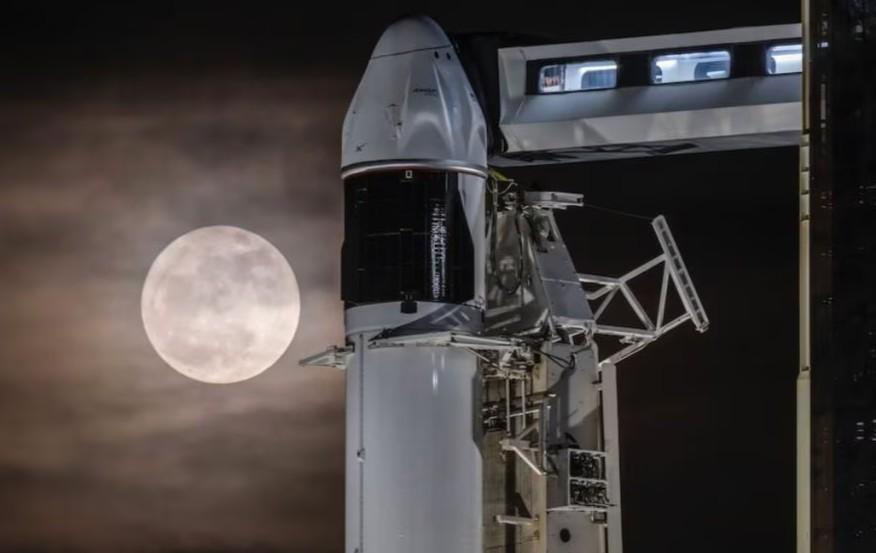
Pichai, Musk & Bezos competing to establish data centres on Moon: Report
In a surprising turn of events, three of the world’s most influential tech moguls, Sundar Pichai, Elon Musk, and Jeff Bezos, are reportedly competing to establish data centres on the Moon. According to a recent report by the Wall Street Journal, these tech giants are exploring the possibility of storing and processing data on the lunar surface. The report highlights the Moon’s unique environment, which offers a stable and low-temperature setting, making it an attractive location for data centres.
The idea of establishing data centres on the Moon may seem like the stuff of science fiction, but it’s not as far-fetched as it sounds. The Moon’s surface offers a unique combination of advantages that make it an attractive location for data centres. For one, the Moon’s low gravity and lack of atmospheric interference reduce the risk of natural disasters and other external factors that can damage data centres on Earth. Additionally, the Moon’s surface temperature can range from -243°C to 127°C, which is much colder than the average temperature on Earth. This extreme cold can help reduce cooling costs for servers, which is a significant expense for data centres.
Another significant advantage of the Moon is its open land, which offers the possibility of building huge facilities without the environmental concerns faced on Earth. On our planet, data centres are often located in areas with limited space, and their construction can have a significant impact on the local ecosystem. In contrast, the Moon’s surface is largely uninhabited and unregulated, making it an attractive location for large-scale data centre construction.
So, what’s driving the push for data centres on the Moon? The answer lies in the increasing demand for data storage and processing. As more and more devices become connected to the internet, the amount of data being generated is growing exponentially. This has created a need for more data centres, which are essentially large facilities that store and process data. By establishing data centres on the Moon, tech companies like Google, SpaceX, and Amazon can tap into the lunar surface’s unique advantages and create a new generation of data centres that are more efficient, reliable, and sustainable.
Sundar Pichai, the CEO of Google, has been at the forefront of the company’s efforts to expand its data centre operations. Google has already invested heavily in data centre construction on Earth, with facilities located in the United States, Europe, and Asia. However, the company is now exploring the possibility of establishing data centres on the Moon, which could provide a significant competitive advantage.
Elon Musk, the CEO of SpaceX, is also reportedly involved in the effort to establish data centres on the Moon. Musk has been a long-time advocate for space exploration and has already made significant investments in SpaceX’s lunar ambitions. The company is currently developing a new spacecraft, called Starship, which is designed to take both people and cargo to the Moon and other destinations in the solar system.
Jeff Bezos, the founder of Amazon, is also competing to establish data centres on the Moon. Bezos has already invested heavily in his space exploration company, Blue Origin, which is developing a new lunar lander called Blue Moon. The lander is designed to take people and cargo to the Moon’s surface, and Bezos has already announced plans to establish a permanent human settlement on the lunar surface.
While the idea of establishing data centres on the Moon is still in its infancy, it’s clear that the tech industry is taking the concept seriously. The potential benefits of lunar data centres are significant, and the competition between Pichai, Musk, and Bezos is likely to drive innovation and investment in the field.
However, there are also significant challenges to overcome. Establishing data centres on the Moon will require significant investment in infrastructure, including the development of new technologies and systems for transporting and storing data on the lunar surface. Additionally, there are regulatory and environmental concerns that will need to be addressed, including the potential impact of lunar data centres on the Moon’s ecosystem.
Despite these challenges, the potential rewards of establishing data centres on the Moon are significant. By tapping into the lunar surface’s unique advantages, tech companies can create a new generation of data centres that are more efficient, reliable, and sustainable. As the demand for data storage and processing continues to grow, the competition to establish data centres on the Moon is likely to heat up, with Pichai, Musk, and Bezos leading the charge.
In conclusion, the report of Sundar Pichai, Elon Musk, and Jeff Bezos competing to establish data centres on the Moon is a significant development that highlights the tech industry’s growing interest in space exploration and development. While there are significant challenges to overcome, the potential benefits of lunar data centres are significant, and the competition between these tech giants is likely to drive innovation and investment in the field.






